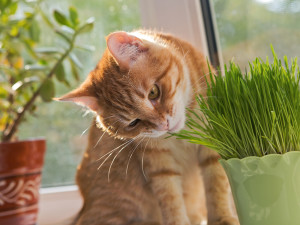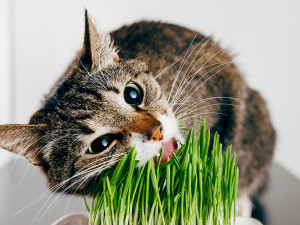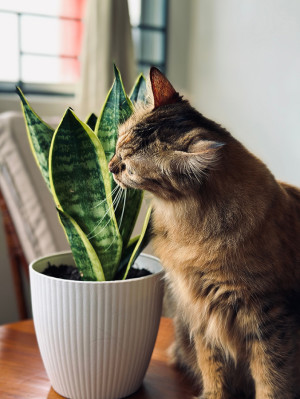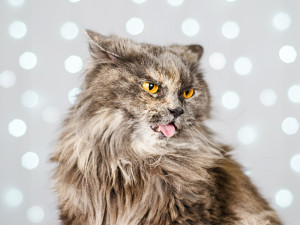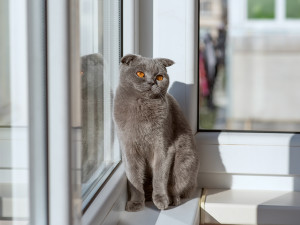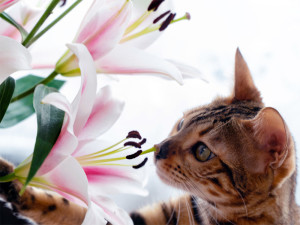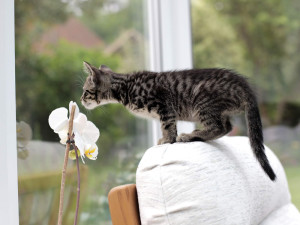Why Does My Cat Eat Grass?
And should they?
In This Article:
Is it Normal for Cats to Eat Grass? Why Do Cats Eat Grass? How Do I Get My Cat to Stop Eating Grass? Should You Go to the Vet Because of Your Cat Eating Grass? Frequently Asked Questions
Is that a cat or a cow? The way some cats eat grass like they’re grazing in a field may make you wonder. Don’t worry. They aren’t trading in their meow for a moo. Cats do eat grass and other greenery. The question is, should they?
Is it normal for cats to eat grass?
In most cases, it’s perfectly normal for your cat to eat grass. But aren’t cats carnivores who only eat meat? Not exactly. They’re obligate carnivores, meaning they can’t get all the nutrients they need from plants and bacteria. They rely on the flesh of prey to provide the missing nutrients.
As long as they aren’t eating grass obsessively and the grass they're eating is safe, you shouldn't need to worry. But there are a few scenarios where you may want to talk to your vet. More on that later.
How much do you spend on your pet per year?
Why do cats eat grass?
The truth is, we don’t know for sure why cats eat grass. There are many theories. Some have been tested. Others are based on what we do know about cats.
Aiding digestion
It’s thought that the fibrous nature of grass can help cats digest and pass their food. In the wild, they’re not just eating meat. They also ingest things like bone, feathers, fur, and dirt. If grass helps with digestion and eliminating those unwanted materials, there’s likely an instinctual drive to eat it.
Inducing vomiting to clear furballs
You see how much cat hair ends up on your furniture and clothes. Well, they ingest a lot of that hair through grooming, too. It doesn’t always pass easily. Hair can collect in the stomach, leading to a furball that needs to be coughed up. Again, the fibrous nature of grass could help.
You often see cats vomit after eating grass. We don’t know for sure whether the furball triggers them to eat grass so they can vomit, or they eat grass for other reasons and vomiting up a furball is the result.
Nutrient intake
Cats eat different types of prey, many of which eat plants themselves. It’s possible cats may be cutting out the intermediary prey and going straight for the plants at times. Once again, we just don’t know for sure.
Instinctual behavior
I’ve mentioned instincts a few times. They’re the biggest driver of a cat’s behavior. Eating grass could simply fall into that category of a behavior cats have done for centuries, whether it’s for digestion, furballs, or some other reason we’ve yet to consider. Today’s house cats maintain those instincts which could explain why they eat grass.
Curiosity and play
If it moves, has a smell, makes a sound, or pretty much just exists, your cat is going to be interested in it. That includes grass. Cats explore with their mouths. They may enjoy the taste and texture of grass, gnawing on it, and eventually, in many cases, puking it up on your rug. They’re weirdos. That's why we love them.
Consult a vet
Even though eating grass can be a normal behavior for your cat, there are times and situations where your veterinarian is needed. Remember, cat instincts don’t consider things like our use of weed killer. They aren’t aware of all potential dangers. And there could be a medical reason for their grass eating.
Should you go to the vet because of your cat eating grass?
Talk to your vet if you have any concerns. Better safe than sorry. There are potential medical causes and risks with eating grass.
When is grass-eating dangerous for cats?
There are dangers in the yard (and home) that our cats aren’t prepared for. Keep an eye out for things like:
Chemicals. Don’t let your cat eat grass in areas where you or others may have used fertilizers, weed killers, bug spray, rodent bait, or any other toxic chemical.
Toxic grass. Not all grasses are safe for cats to eat. Do your research and learn about the grasses in your area.
Grass seeds. Some grass seeds are dart-shaped with spikes. They can cause serious medical issues if ingested and can even penetrate the skin of the mouth or other areas of the body.
Toxic plants. Cats eat many types of greenery, indoor and out. Some can be toxic — ranging from mild to deadly. For example, even just the pollen from certain lilies can cause kidney failure. So, they don't have to eat the plant itself. Eating grass where pollen has landed can do serious damage. Knowing what's in your yard and home is vital so you can steer your cat clear of danger.
Medical reasons cats may be eating grass
If your cat is obsessively eating grass to a point where you have a hard time distracting them, it’s time to talk to your vet. They may be instinctively trying to compensate for something like severe constipation, nutrient deficiencies, or other medical issues.
If your cat is eating grass and vomiting more than occasionally, call your vet. Furballs or vomit shouldn’t be a regular occurrence. They could have gastrointestinal issues and even an intestinal blockage since cats can't digest grass well.
If you’re concerned that your cat may have eaten something dangerous, be it the grass itself or something on the grass, don’t wait. Call the Pet-Poison Helplineopens in new tab or your vet right away. Try to identify the plant or substance, or get a sample using protective gloves and enclosing it in an airtight container away from your cat. If your cat has vomited up part of the grass (or plant), you can use that as a sample.
Some signs of eating toxic plants include:
Watery eyes
Itchiness
Swelling
Irritation around mouth
Vomiting and/or diarrhea
Drooling
Difficulty breathing
Irregular heartbeat
Frequent urination
How do I stop my cat from eating grass?
As long as your vet isn’t concerned, you probably don’t need to stop your cat from eating grass. But if it’s an unwanted behavior, or you're worried about safety, there are some things you can try.
Provide cat grass.
Indoor cat grass can be grown as a treat for your cat. Thoughts on cat grass benefits are as varied as those on why cats eat grass in the first place. But if they seem to enjoy it, this can be a safer option. If they get overly excited about it, you may need to put it out of reach and give them measured amounts as a treat.
Offer a balanced diet.
To rule out the possibility of nutritional deficiency, feed your cat a nutritionally-complete meal. That's easy. Your cat food should include a label that says, “complete and balanced,” meaning it contains all the nutrients your cat needs and in the proper amounts.
Use cat-safe plants.
Do your research. There are cat-safe plants you can have around your home. We’ve got a list of the top 10 cat-safe plants you can check out.
Enrich your cat’s environment.
Boredom is a factor in a lot of unwanted cat behavior. Give your cat fun and engaging activities daily to help. Interactive play, self-play, food puzzles, treat hunts, training sessions, watching birds — there are lots of simple options that don’t take much of your time.
Remove the plants.
When your cat eats grass or plants, neutrally and calmly remove them. Yelling or punishment won’t work. And don't give them attention. Just get up, remove them, and go back to what you were doing. Wait a minute or two. Then, give them something else to focus on.
Try a short play session, give a food puzzle, etc., so they can burn off that energy, making them less likely to go right back to the grass or plant. And when they’re in that area but not eating the greenery, reward them. In time, this can help fade out the behavior, as long as there’s no intense instinctual or medical cause.
FAQs (People also ask):
Is it OK to let my cat eat grass?
In most cases, it’s OK to let your cat eat grass, as long as there's no concern about medical issues, like nutrient deficiency, the grass hasn’t been subjected to any toxic chemicals or substances, and there aren't any highly toxic plants nearby.
Why do indoor cats eat grass?
We don't know why cats, indoor or outdoor, eat grass. There are lots of theories, including instinctual behavior, aiding with digestion and furballs, enjoyment, and more.
Do cats eat grass when they have worms?
Opinions differ on whether cats eat grass when they have worms. It’s thought that wild animals do this, and our house cat’s ancestors could have done the same. So, it's certainly possible our cats could continue this instinctual behavior.
References:
Lovely Lilies and Curious Cats: A Dangerous Combinationopens in new tab
What Does ‘Complete and Balanced’ Mean on Cat Food Labels?opens in new tab



